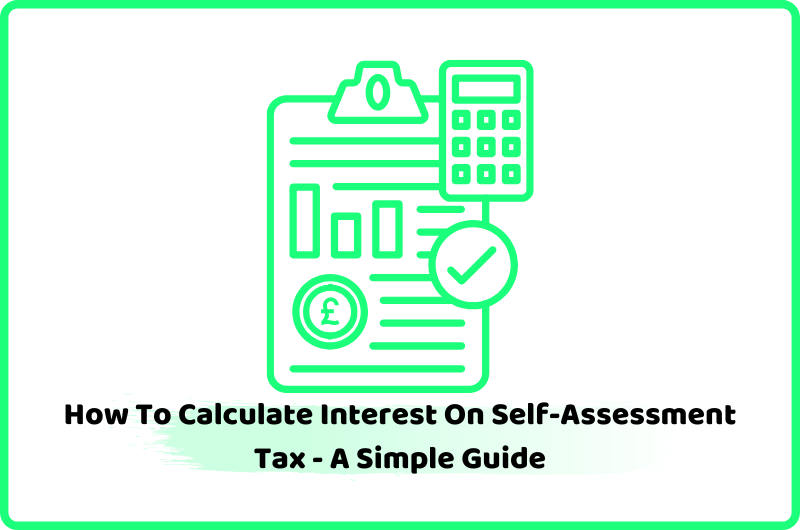How To Calculate Interest On Self-Assessment Tax – A Simple Guide
Paying your taxes on time is very important, but sometimes delays happen. If you miss the deadline to pay your tax bill in the UK. HMRC will charge interest on your unpaid amount. Understanding how to calculate interest on self-assessment tax can help you to manage your finances better and avoid unnecessary penalties. In this blog, we will break down everything you need to know about how to calculate interest on self assessment tax simply.
Reach out to one of our professionals to learn about how to calculate interest on self-assessment tax in the UK. Get in touch with us, and you will be provided instant professional help!
What is Self Assessment Tax?
Self-assessment tax is a tax-based system by HMRC to collect income tax from self-employed, company directors, and additional sources of income. If you fall into these categories, you must need to complete your self-assessment tax return each year and pay any tax before the deadline.
How Does HMRC Charge Interest On Late Self-Assessment Tax?
When you miss the deadline to pay your tax payment to HMRC. The HMRC charged the outstanding amount. The interest rate is set by the HMRC, and it can change over time. The interest is applied daily from the day after the deadline until the tax is fully paid. If you want to understand this better, you should know how to calculate interest on self assessment Tax.
How to Calculate Interest on Self Assessment Tax?
The calculation of self-assessment tax interest requires a step-by-step process, which includes the following points:
Find the Outstanding Amount: The Outstanding Amount represents the self-assessment tax which HMRC expects from you following the deadline.
Check the Current Interest Rate: The interest rate which HMRC updates on a regular basis remains available for review. The up-to-date interest rates are available on HMRC’s website.
Multiply by the Interest Rate: You can obtain the daily interest rate by dividing the annual interest rate by 365 days.
Multiply by the Number of Days Late: Track the delay duration between when payments become due to when your payment is planned.
How to Avoid Paying Interest on Self-Assessment Tax?
Pay On Time: Meet your deadlines for 31 January and 31 July to ensure timely payment.
Set Up a Direct Debit: Direct Debit automation helps you prevent payment delays effectively.
Make Payments in Advance: An early payment of funds decreases your potential interest costs.
Use HMRC’s Budget Payment Plan: You can utilise HMRC’s Budget Payment Plan to distribute your next tax bill payments monthly.
Check Your Tax Bill Early: Finishing your tax return in advance gives you enough time to organise your payments before the deadline.
What Happens If You Don’t Pay at All?
When you postpone your tax payment, the government’s tax authority, HMRC, will charge late penalties besides charging interest payments. There are three late payment penalties.
- A penalty of 5% for any unpaid tax will apply 30 days after the due date.
- A penalty of 5% will be assessed against unpaid taxes starting five months after the penalty date
- Taxpayers who wait 11 months past the penalty date face a 5% fee on their outstanding payments.
The delay in payment adds increased expense to your total bill so you should always make payments as soon as possible.
Need Help with Your Self-Assessment Tax?
Your tax calculations present difficulties, while late payment penalties create problems for you. The professional team at our organisation assists with self-assessment tax preparation, interest computation and payment arrangement establishment. Are you unsure how to calculate interest on self assessment tax? We can provide you with our services for this process. Call us to gain compliance status and prevent unnecessary fees. Contact us today!
Conclusion
Knowledge of self-assessment interest calculation methods enables you to prevent unnecessary additional costs in your tax bill. Understanding the process of how to calculate interest on self assessment tax helps people manage their payments efficiently. Daily rates of interest apply to unpaid taxes therefore, quick payment becomes essential. Review HMRC’s current interest rates before you make your payments because it helps you avoid extra costs. Speak with a tax advisor or contact HMRC so you can explore payment plan options when dealing with tax bill challenges.
Get in touch with our young, clever, and tech-driven professionals if you want to choose the solution to tax burden or accounting problems in the UK for your income. We will ensure to offer the best services.


